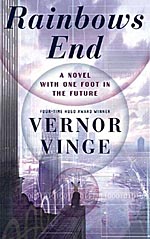
![]() icowrich
icowrich
10/27/2008
![]()
Okay, here are the problems I had with Rainbow's End:
1) A thirteen year old girl uses words like "devious twiddling" to describe advanced eye treatment, and later opines that her grandfather never "suffers fools gladly". I mean, seriously, what 13 year old girl says that? One girl as young as ten later discusses international politics with her, as well. These are some pretty advanced kiddos, if you ask me. Maybe Vinge believes that educational advances in the next 20 years will make kids learn younger and younger in response to the pressures of competition. Nevertheless, it just seems Vinge has forgotten what kids are like.
2) Adults and children sometimes speak in a way that is anachronistic in 2007, let alone 2025. Vinge does create a lot of words that don't currently exist, and that does enrich the dialogue in the work, but the overall language is something that would still be very familiar to people in their 50s. The anachronistic language ("talking people up", for instance, which is put in the mouth of a high school kid) is not constant, but it is distracting when the reader comes upon them.
3) This book is set 18 years in the future as I read it (maybe 20 years as Vinge was writing it). Miniaturization has not only progressed to the point of being extreme (whole computer displays fit in your eye as a contact lens), but the devices are so cheap as to be absolutely everywhere. Not only has this technology become all-pervasive, but it seems to have been around for a long time. People in their 20s seem to be unaware of what life was like before such technology (they don't even seem to know what books are), and characters old enough to remember the world-as-the-reader-knows-it are hopelesslly obsolete. We have flying taxis, immersive worlds and an entire economy based on building alternate landscapes for the world the characters experience. Not only is this technology pervasive and established, it is also (apparently) so cheap that even children can afford the things.
All of these caveats notwithstanding, I like Rainbow's End quite a bit.
1) Even though the technology is unrealistically optimistic (or pessimistic, depending on how you view the tek) for 2025, I don't doubt that such a culture is likely to exist eventually. It was relatively easy for me to mentally push the events further into the future (say, the second half of the 21st century). I, for one, can't wait for contact lens displays, flying cars, and immersive worlds.
2) Despite aforementioned problems with dialogue, Vinge has a fantastic way with words. When the poet protagonist's sullen mood is interrupted by his unwelcome grandaughter's well-intentioned advice, Vinge says that "the words were noise, scraping on his despair".
3) The social implications of all this technology is what sci-fi is most purely about, and Rainbow's End delivers. Biological warfare in the form of genetic manipulation is a major threat in this world. Mind control via mimetic devices are described as YHBM (or, you gotta beleive me) technology. Literary knowledge has apparently decayed significantly -- the incredibily eloquent 13-year old girl doesn't seem to know who Ezra Pound is. Children are far more tech-savvy than adults, making them the driving force of the information economy (at least, more of a force than they are today).
http://www.worldswithoutend.com